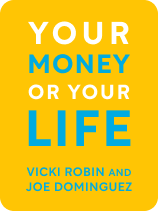

This article is an excerpt from the Shortform book guide to "Your Money or Your Life" by Vicki Robin and Joe Dominguez. Shortform has the world's best summaries and analyses of books you should be reading.
Like this article? Sign up for a free trial here .
Do you believe that money buys happiness? How much money is “enough”?
The idea that money buys happiness ironically can lead us to choose money over life. That ends up hurting our well-being rather than improving it. Learn why we choose money over life and what we can do about it.
Read more to discover the truth about the notion that money buys happiness.
Exposing the Myth That Money Buys Happiness
There’s growing evidence that wanting more and valuing our job over our personal life has detrimental effects. In one US survey:
- 60 percent of people suffered from job-related stress, anxiety, and depression.
- 12 percent of people worked more than 50 hours in a week.
- The majority expressed dissatisfaction with their jobs.
Yet we’ve little to show for all this hassle. Economic circumstances in the US mean people are earning less, saving less, and accumulating more debt. Here are the numbers:
- The majority of wage earners haven’t seen their pay increase more than 5.3 percent since 2000.
- Before the 1980s, people saved over 10 percent of their income. Today, most save 5 percent or less.
- Lower earnings and savings have led to more debt—about $11,000 for every person in the US.
The belief that money buys happiness can lead us to choose money over life. There are two reasons that we make this choice: We don’t know how to leave jobs we don’t like, and we don’t know how much money is “enough” for our happiness.
We Don’t Know How to Leave Jobs We Don’t Like
We don’t know how to leave jobs we don’t like because our work is tied to our identity, and we think we need to stay with jobs to earn money.
Identity
We conflate our job with our identity and worth as human beings. We also judge others based on their work. For instance, teaching is considered less prestigious than being a doctor, even though guiding and instructing children is arguably just as demanding. This is called jobism.
We spend so much time working that it has become the main way that we express ourselves, but this wasn’t always the case. We used to develop identity from our interactions in the community, through places like churches and neighborhoods.
Additional Reasons
There are three additional reasons that we stay in jobs we don’t like:
1. We face burnout, boredom if the work isn’t challenging enough, and a competitive atmosphere that is hard to succeed in. Though these seem like reasons to leave a job, we often interpret these circumstances as the norm in all workplaces—and any notion we had of finding the dream job of our childhoods gets filed away as idealistic. We think that this is the best we can get.
Example: Elaine wished she could leave her job as a computer programmer. The work bored her and she hated it. But she worked well enough that she wouldn’t be fired. Her earnings bought luxuries, like a sports car, but not satisfaction. She thought that life would always be this way, no matter the work she did.
2. We have debts—house payments, student loans, and more—that can make leaving a job difficult.
3. We have bought into the idea that we need money and the things it can buy to satisfy our needs. We believe that money buys happiness.
We Don’t Know How Much Money Is “Enough” for Our Happiness
The second reason we choose money over life is that we don’t recognize when we have “enough” money. This is due to money lessons we learned in childhood and continue to apply as adults. Many of us were taught that money buys happiness.
Childhood: Learning About Money
Many habits get solidified in childhood before we’re fully aware of them. When we carry these behaviors into adulthood unchecked, they can be harmful to our wellbeing.
Young children are hard-wired to meet their needs externally. If you were hungry, you’d cry and a parent fed you. Over time, you learned that not only could your basic needs be met by looking outside of yourself, but so could your desire for niceties—things beyond basic needs that enriched your life in some way, like a bicycle or a toy. But you learned that you needed money for such goods—and to have money, you needed to work.
Eventually, you expanded from using money to purchase basic goods and niceties to purchasing luxury goods. As you got older, you continued to look externally to address your emotional needs. You bought into the idea that money buys happiness. This required spending money.
Adulthood: The Elusiveness of Happiness
It’s difficult to discern when we have enough. As we enter adulthood, we expect to accumulate wealth and possessions as we move through our lives. From lavish weddings to ice cream cones, we spend money both to mark our successes and to comfort ourselves in times of distress or boredom.
We think that we’ll feel happier and more satisfied as we spend money. We believe that money buys happiness. But often, this isn’t the case. Most people want about 50 percent more income than they have. A study asked people to state their income and rate their happiness on a scale of 1 to 5, from completely unhappy to completely fulfilled. Scores ranged from 2.6-2.8 regardless of how much money the person earned—people earning below $1,500 a month and over $6,000 a month gave roughly the same responses.
To remedy this, we need to identify what is enough for us, both from a money perspective and a stuff perspective. This means:
- Examining how much money it takes to satisfy basic needs, niceties, and even some luxuries.
- Spending within our means so that we don’t take on debt.
- Avoiding having excess stuff, or clutter, that causes us stress, guilt, or shame. When we accumulate stuff that we don’t use, like once-worn clothes that we then donate, we question our motives for buying them in the first place, augmenting our dissatisfaction.
- Reducing clutter. This includes spending time and money on immaterial experiences and activities that have no meaning for us, like going to a networking event that you have no interest in.
The idea that money buys happiness can lead us to choose money over life. That ends up hurting our well-being rather than improving it.

———End of Preview———
Like what you just read? Read the rest of the world's best book summary and analysis of Vicki Robin and Joe Dominguez's "Your Money or Your Life" at Shortform .
Here's what you'll find in our full Your Money or Your Life summary :
- The 9 steps to reach financial independence
- How to change your entire relationship with money and live a more meaningful life
- How to align your spending habits with your values, purpose, and dreams






